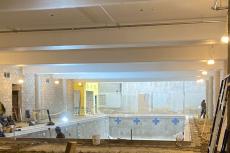The East Hampton Town Board took initial steps this week toward a permanent allowance of “hybrid” meetings, in which video conferencing would enable both in-person and remote participation of the board and its committees.
Changes adopted with New York State’s 2022-23 budget make permanent Covid-19 pandemic-era exceptions to New York State’s Open Meetings Law that allowed meetings to be held, and the public to participate, via video conference. In order to do so, however, a county, city, town, or village’s governing body must pass a local law, following a public hearing, authorizing the use of video conferencing.
Permanent legislation must ensure the ability of the public and the media to directly access government officials in person, according to a statement issued by Assemblyman Fred W. Thiele Jr. last week. Mr. Thiele is chairman of the Assembly Committee on Local Governments. The public body will also have to establish written procedures governing member and public attendance consistent with state law, with those procedures conspicuously posted on its website.
John Jilnicki, the town attorney, went over the requirements with the board, members of which have previously endorsed the hybrid format and expressed a willingness to make it permanent. Hybrid meetings, Supervisor Peter Van Scoyoc said, have resulted in “greater engagement by the public in town board and government activities, which is welcomed” and “helps our democracy work.”
The board must decide whether to adopt rules and processes for all boards or allow each to adopt its own, Mr. Jilnicki said, offering his recommendation that the board adopt rules and processes that would apply uniformly to all boards.
Board members themselves should be physically present at meetings, he said, with at minimum a quorum present. That would require the physical presence of three of the five town board members. “It seems you don’t necessarily have to be present in the same location,” he said, “but you have to be publicly accessible so the public can come and watch.” There is some flexibility, he said, as to the reasons a board member could participate remotely, such as illness, disability, child care, or a significant or unexpected event.
The public must have the right to see and hear the proceedings, Mr. Jilnicki said, and be able to comment in real time. Audio and video of meetings must be linked to the governing body’s website.
Should a public body pass a new law authorizing hybrid meetings, the current authority to hold virtual meetings without an in-person component will continue for 60 days after the effective date of the new law.




